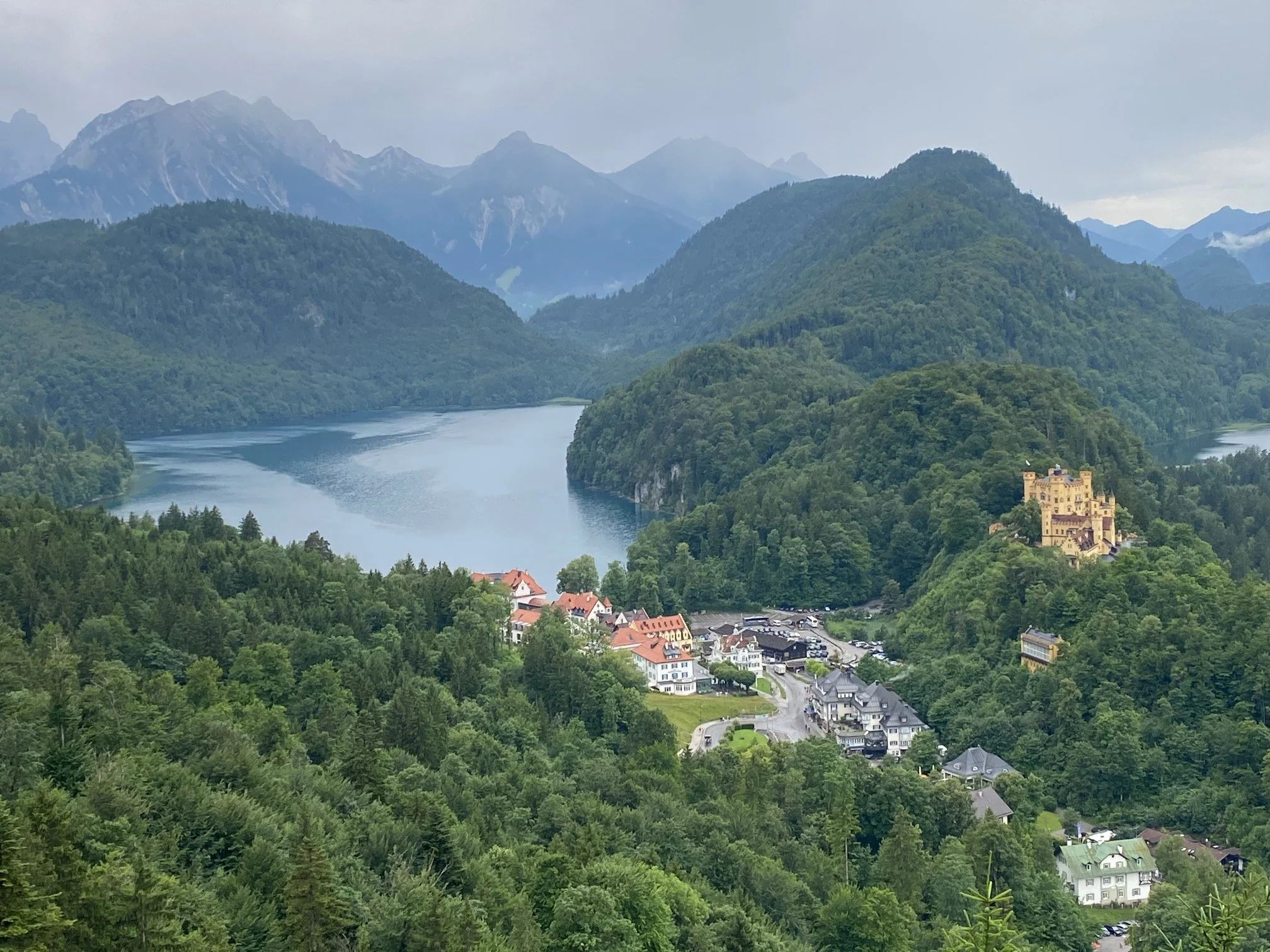
July 3-11, 2026
Bavarian Alps Tour
Tour Duration
7 days cycling
8 nights
Intensity
3/5
options
Cycling companion staying in the same room
price
$5,200 (price increases to $5,500 on April 1, 2026)
Tour Highlights
-
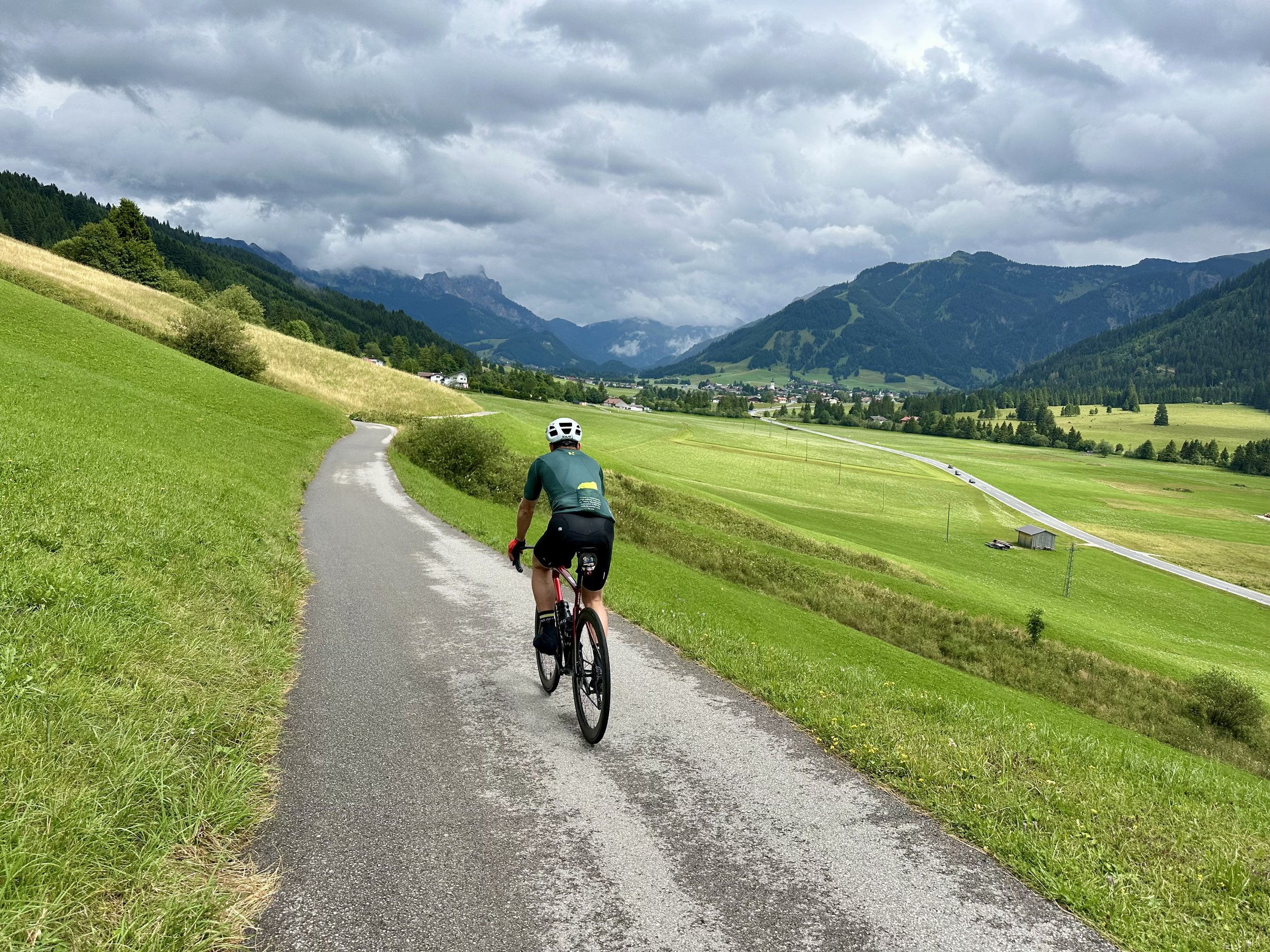
A spectacular 7 day/8 night summer cycling adventure that follows the German/Austrian border from Lake Constance to Salzburg, with jaw-dropping views of lakes and peaks.
-
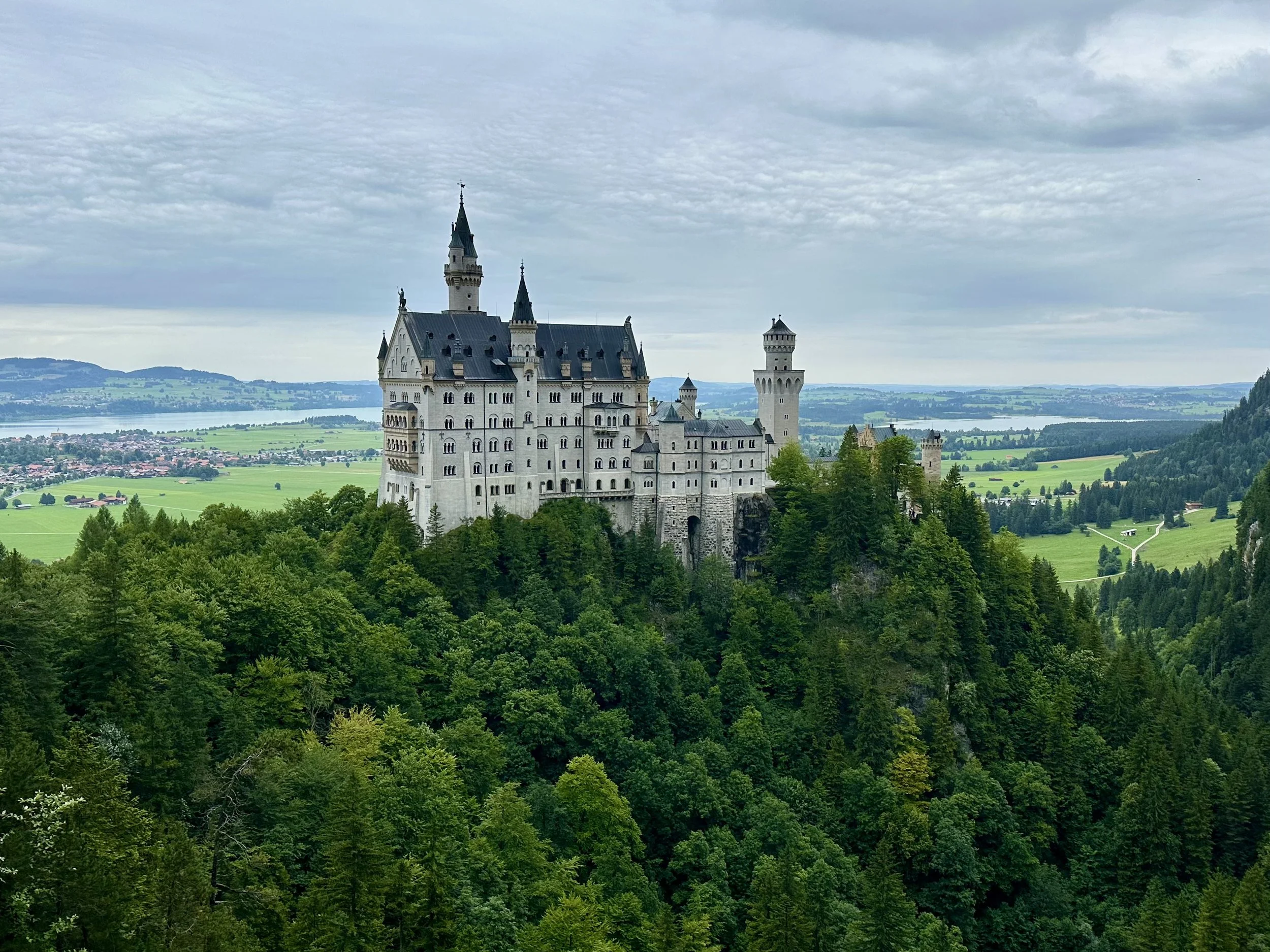
Discover a culturally-rich land of fairy-tale castles and charming mountain villages that have been turned into open-air galleries with their meticulously painted houses and buildings.
-
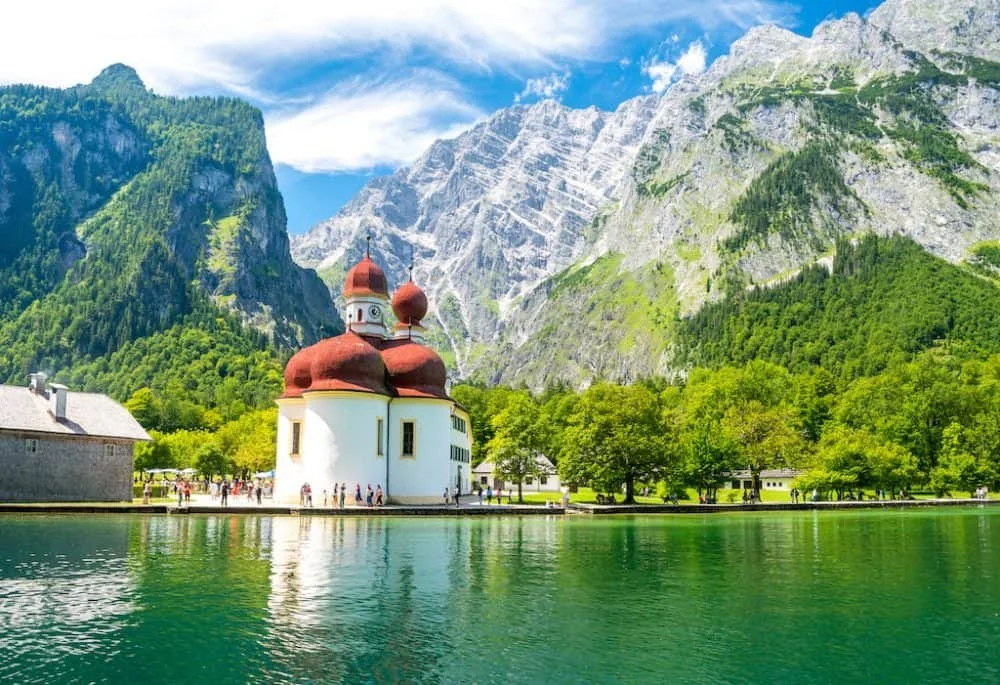
Explore historical sites that engage both your heart and your mind, and discover biergartens serving amazing wiener schnitzel, apfelstrudel and Bavarian beers from breweries hundreds of years old.
-
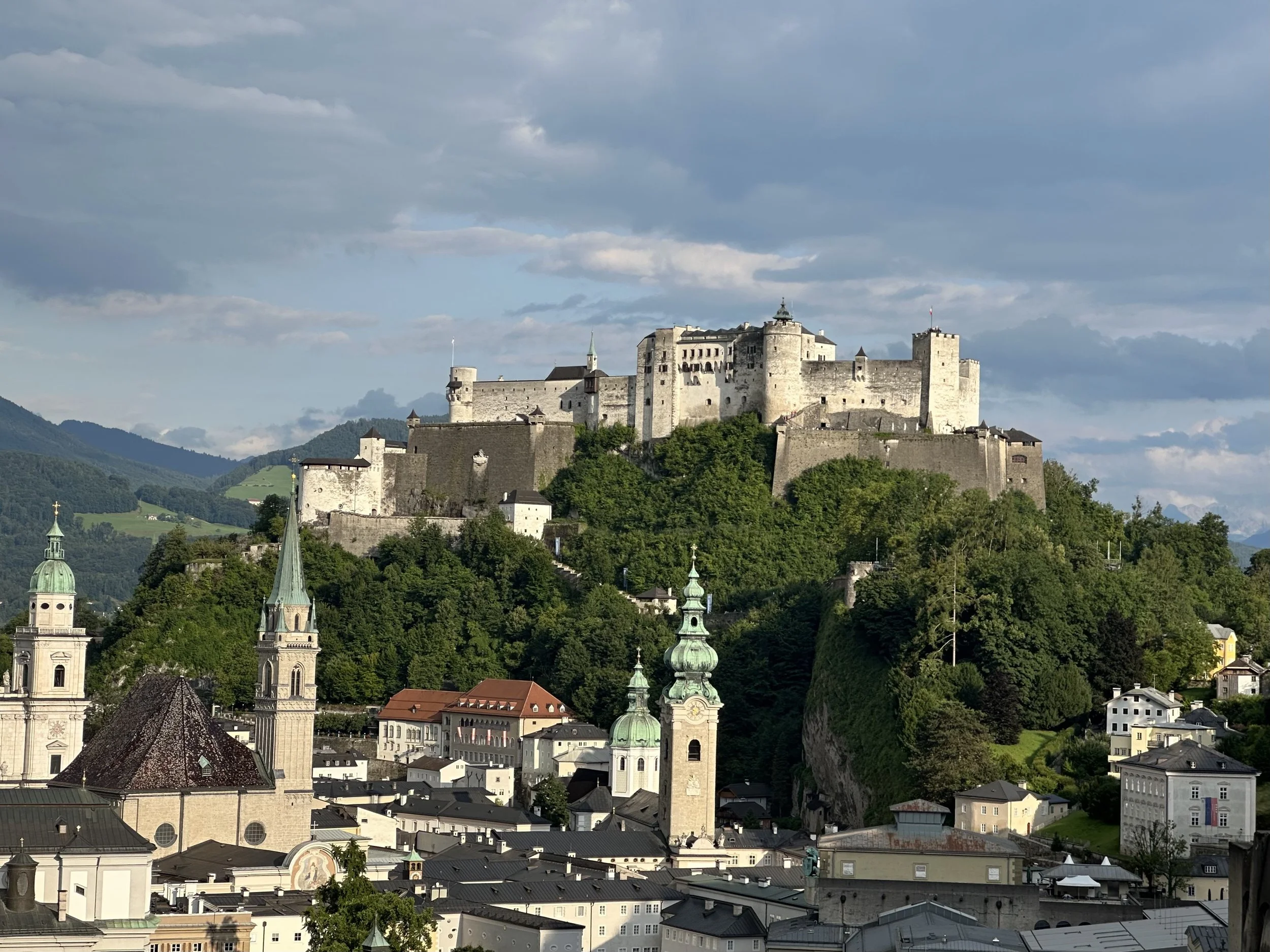
Experience the magical city of Salzburg, Austria (where our trip ends), with its rich musical heritage, beautiful architecture and narrow cobblestone streets, all surrounded by stunning Alpine scenery.
A unique cycling Randonnée* designed for the active cyclist who wants to immerse themselves in the mountain beauty and culture of Bavaria. Our daily rides are challenging, but they are often routed through valleys and without the singular diet of elevation typical of our summer tours in the French, Swiss and Italian Alps. You will still experience the same wonder and joy that we deliver on all our tours, but with less than half the climbing.
The Bavarian Alps form one of the most enchanting and culturally rich mountain regions in Europe, straddling the border between southern Germany (Bavaria) and western Austria (primarily Tyrol and Salzburg states). This distinctive region evokes a timeless sense of alpine beauty — a place where dramatic landscapes, misty peaks, mirrored lakes, and bell-clad cattle form the backdrop to a way of life deeply rooted in nature, community, and tradition. Whether you come for adventure, tranquility, or culture, this borderland between Germany and Austria feels both deeply authentic and almost storybook in its perfection, integrating majesty, mystique, stunning vistas and culinary delights.
Our cycling tour, a classic randonnée, begins on the beautiful shores of Lake Constance (Bodensee), Germany’s vast inland sea that also borders Switzerland and Austria. The region’s mild climate and lush orchards make it the perfect prelude to the rugged mountains that lie ahead of us. Most of us will arrive via ferry from Konstance, Switzerland, watching the sailboats on the water framed by the Alps in the distance as we cross the lake to Meersburg, Germany, where our tour begins. Perched dramatically on a hillside above the lake, Meersburg combines half-timbered houses, steep cobbled lanes, terraced vineyards, and panoramic lake views. After checking into our lakeside hotel we can stroll the promenade and sip coffee by the harbor, or explore the town, walking its narrow alleys past stone gates and vine-covered walls to the Alte Burg (Old Castle), claimed to be Germany’s oldest inhabited castle, dating to the 7th century.
From the shimmering expanse of Lake Constance we will cycle eastward - over seven days and eight nights - to the musical grace of Salzburg, a journey that is an immersion into Europe’s soul. Each stop will reveal a different facet of alpine life: the harmony between man and mountain, the reverence for beauty, and the enduring rhythm of tradition that continues to shape this timeless region. You will be treated to a sensory overload with opportunities to visit numerous points of interest and sample the best the land has to offer, all while traveling on carbon-fiber road bikes.
We designed this tour because we love to cycle the European alps, and while there are many opportunities to cycle in the mountains of France, Switzerland and Italy, we found no one operating fully supported tours in Bavaria for the serious cyclist. Others do offer shorter tours that provide a small taste of the beauty and culture of the region, but none with the length and breadth that we deemed most appealing to our target cyclist. One of our trip organizers, who has a German heritage and loves this region, has carefully curated a route that will delight our guests, described here. If this tour interests you, please move quickly to register - it is limited to 11 participants.
If you have not cycled with us before, you will be delighted to find that our attractive price point includes a package that offers far more than other operators, including: two-to-three more hotel nights and one-to-two more days cycling than typical tours; a high-end carbon-fiber, electronic shifting road bike rental at no additional cost; a single occupancy room at no additional cost (others expect you to share your room and fight for the shower and luggage space after a long day on the bike); and, all meals - including local table wines and beer at dinner - once our tour starts (others send you out on your own a couple of nights to find dinner). Guests also tell us that the on-the-road support they receive is second to none, with a professional mechanic looking after our bikes and amazing feed tables.
*Randonnée is the French term for "excursion" or "rambling", and in cycling refers to a long distance tour where one rides from one point to another daily, village-to-village, changing hotels each night.
Day-to-Day Itinerary
-
Our tour begins on the shores of Lake Constance (Bodensee), at the Hotel Wilder Mann in Meersburg, Germany. We recommend participants fly into Zürich, Switzerland (ZRH), and make their way to the train station in the airport, where they can purchase a combined train/ferry ticket to Meersburg (Bodensee). A typical itinerary will include a direct train (64 min) from ZRH to Konstanz, a walk (8 min) to the Konstanz Hafen ferry terminal, and a short wait followed by a ferry (40 min) across the lake to Meersburg: total travel time a little over 2 hours. From the Meersburg ferry terminal to our hotel is a 10 min walk, where the Rivendell Cycling team will meet you. After checking in you will be free to explore the town, until we meet late afternoon for your bike fitting.
Perched on a steep hillside above the shimmering waters of Lake Constance, Meersburg is one of southern Germany’s most picturesque and historic towns. With its medieval architecture, vine-covered terraces, and breathtaking views of the Alps across the lake, Meersburg embodies the charm and serenity of the Bodensee region. It is a place where time seems to move at a gentler pace, inviting visitors to wander, taste, and dream amid centuries of culture and natural beauty.
The town is divided into two distinct levels — the Oberstadt (Upper Town) and the Unterstadt (Lower Town) — connected by narrow, winding stairways and cobbled lanes. This vertical design gives Meersburg its unique character and offers spectacular vistas from almost every corner. From the lakeside promenade, where boats glide in and out of the harbor, one can climb through terraced vineyards to reach the old town, a maze of half-timbered houses, colorful façades, and flower-decked balconies.
Dominating the skyline is the Alte Burg (Old Castle), dating to the 7th century. It has been expanded over the centuries into a romantic fortress overlooking the lake. Inside, the castle’s rooms and armory evoke the life of medieval knights and noble families. From the battlements, visitors can gaze across Lake Constance toward the Swiss Alps, where snowcapped peaks shimmer above the water on clear days. Just a short walk away stands the Neues Schloss (New Castle), a Baroque masterpiece built in the 18th century as the residence of the prince-bishops of Constance. Its elegant façade, grand staircase, and ceiling frescoes reflect the splendor of the Rococo age, contrasting beautifully with the rugged medieval character of the Old Castle nearby.
Meersburg’s charm, however, extends far beyond its monuments. The town’s atmosphere is infused with warmth and vitality. Outdoor cafés line the narrow streets, offering local wines and views of the lake. The region’s mild climate, moderated by the vast expanse of water, makes it ideal for growing grapes and fruit. Meersburg’s vineyards are among the oldest in Germany, and the local white wine — especially the Müller-Thurgau variety — is a source of great pride.
After our bike fitting we will enjoy a welcome dinner together overlooking the lake, where you will be provided with an overview of the week’s activities.
-
The Ride:
Meersburg, Germany to Eichenberg, Austria | 57 km (35 miles) | 660m (2,220 ft) elevation.What to Expect:
Given this is our first day in Germany, and many in our group will be a bit jet-lagged, we will start our first cycling day an hour later than we will the rest of the week, and our optional inspirational morning devotions will begin at 8:30 AM, breakfast following. At 9:30 AM riders will bring all luggage and day bags to the vans, prep bikes, and visit our pre-ride table. At 9:45 we will have a safety briefing and a leisurely roll-out, headed southeast along the lake towards the Austrian border. We will be cycling one of the most beautiful and popular cycling routes in Germany — part of the famous Bodensee-Radweg (Lake Constance Cycle Path) that loops around the entire lake through Germany, Austria, and Switzerland.The section we will cycle will take us through a landscape of vineyards, orchards, and medieval lakefront villages, with constant views of the water and the Alps. When we arrive Friedrichshafen, the largest city on this day’s route, we will stop at the Zeppelin Museum, with its fascinating exhibits on airship history. Shortly thereafter we will stop for a lakeside lunch, before continuing to the stunning island town of Lindau, connected to the mainland by a causeway. After cycling past the harbor and its lighthouse — one of Germany’s most iconic lakefront views — and the Old Town with its pastel-colored houses, arcaded squares, and cafés (where we may stop for a coffee and a pastry), we will reach the Austrian border and our one-and-only climb of the day.
Our destination is the charming Hotel Schönblick in Eichenberg, Austria, which overlooks the lake. But to get there we have a 4 km climb at an average 9% grade, with some sections considerably steeper. The effort is well worth it, with stunning views of the lake and three countries, and since we will arrive the hotel mid-afternoon, after enjoying our post-ride table, there will be time for rest and recovery, including a pool and spa features to enjoy. At 7:00 PM we will meet for dinner on the terrace overlooking the lake.
-
The Ride:
Eichenberg, Austria to Füssen, Germany | 115 km (71 miles) | 1,620 m (5,450 ft) elevation.What to Expect:
While our prior day was designed as a relatively easy ride to get over jet lag, today we have the longest distance of our seven days in store. After taking one last look at the glorious expanse of Lake Constance and the Swiss alps in the distance, we start our day riding into the Bavarian alps on amazing, lightly trafficked backroads that wander through sleepy villages. While we start in Austria, we will soon cross the border into Germany — and before the end of the day we will cross the border back into Austria and then back into Germany!15 miles (25 km) into our route we will descend into a valley that we will cycle for the next 22 miles (35 km). As we approach our lunch stop at the Cafe Bistro Relax in the town square of Immenstadt im Allgäu (popular with cyclists), we will cycle past the largest natural lake in the Allgäu region, Großer Alpsee. This popular lake is framed by gently rolling hills, forested slopes, alpine meadows with lush green pastures, traditional Bavarian farmhouses, and distant mountain peaks.
Our ride through the valley ends when we reach the health resort town of Bad Hindelang, whose sulphur springs have been used for cures since the 19th century, and we begin the first named climb of the trip, Oberjoch Pass. Officially 9.6 km at an average 3.8% grade, it is the 5 km of switchbacks at a 5.1% grade early in the climb that presents the biggest challenge. At the top of that section we will stop in a parking lot for a feed stop, and then walk to a panoramic overlook where we can look down at the twisty road we just summited from the valley. Four kilometers later (which are at a more modest grade) we reach the summit, and a few kilometers after that cross back into Austria.
Over the next 40 kilometers we will cycle a combination of bike paths and roads through alpine meadows and farmland, and pass Haldensee, a lovely alpine lake. A few kilometers before we reach our destination, Füssen, we will cross the border back into Germany. Famous today as the gateway to Bavaria’s most iconic landmarks, Neuschwanstein Castle and Hohenschwangau Castle, and also for violin manufacturing, Füssen’s history dates to Roman times, when it was a key town on the Via Claudia Augusta, the road that connected northern Italy with Augsburg, Germany. After arriving our hotel, enjoying our post-ride table, and cleaning up, riders will want to explore the car-free old town of Füssen. With its cobbled streets brimming with medieval charm, and pastel-colored buildings and flower boxes that contrast gorgeously with its mountainous backdrop, it is hard not to be enchanted. Our dinner will be in the biergarten (the “Hirschgarten”) at our Hotel Hirsch.
Hotel: https://hotelhirsch.de/en/
-
The Ride:
Füssen to Garmisch-Partenkirchen | 89 km (55 miles) | 1,225 m (4,125 ft) elevation.What to Expect:
After starting our day with an early breakfast, we will take the vans to the parking lot near Neuschwanstein Castle and hike to Mary’s bridge. Perched dramatically on a forested hilltop, Neuschwanstein looks like a dream from a medieval legend, even though it was built in the 19th century by King Ludwig II. Nearby, tranquil mountain lakes like the Alpsee and Schwan See will invite us to pause and take in the view of snow-dusted peaks mirrored in their waters, together with that of magical Hohenschwangau Castle. Today’s inspirational talk will take place with these majestic views surrounding us.We will then make our way back to our vans and to the hotel, where we will kit up for the day’s ride with an estimated start time of 11:00 AM. Soon after starting our ride we will cycle across the border into Austria, and after about 20 km, make our lunch stop alongside the stunning Plansee, the second largest alpine lake in the state of Tyrol, known for its crystal clear water. After lunch we will get to cycle alongside the lake for a few more kilometers, and then continue on a delightfully serene road that will take us back into Germany 35 km into our route. Not long after that we will arrive at the fabulous Schloss Linderhof, the smallest of the three palaces built by King Ludwig II of Bavaria. This one was used as his primary residence, and it is the only one completed during his lifetime.
After our castle visit we will cycle 15 km up the road to an afternoon coffee stop in Oberammergau, a picturesque village where time seems to have stood still. Famous in part for its once-every-ten-years Passion Play, the village is also renowned for its incredible Lüftlmalerei — colorful frescoes adorning many of its houses, depicting religious scenes and folk motifs (think murals on steroids).
Our route then curves to the south, and we will cycle some of the nicest bike paths on the planet to Garmisch-Partenkirchen, Germany’s premier alpine resort town and the site of the 1936 Winter Olympics. Surrounded by towering mountains, including the Zugspitze, Germany’s highest peak, Garmisch offers year-round outdoor activities: skiing and snowboarding in winter, hiking and paragliding in summer. The town itself blends Bavarian hospitality with a touch of cosmopolitan flair, offering lively cafés and traditional guesthouses decorated with frescoed façades similar to what we will have seen in Oberammergau.
After cycling through Garmisch we will arrive at the turn to our hotel in Grainau, but unless the time is late or the weather is terrible, we will encourage riders to continue on with an optional small climb to end the day. Only 4 km further west is a lake at the northerly base of the Zugspitze, the Eibsee, considered one of the most beautiful lakes in the Bavarian Alps: visitors are often struck speechless by the lake’s emerald waters surrounded by majestic, snow-capped peaks. Those tackling the climb will ascend 850 feet (260m) at a 6.5% grade to the Zugspitze parking lot, and then, after marveling at the view, turn around and enjoy a fast 4 km descent back to the turn to our hotel, another one kilometer at a small uphill grade.
After a visit to the hotel biergarten, we’ll dine at 7:30pm. Following dinner, we’ll take the vans into Garmisch to enjoy the shops/bars and gelato.
-
The Ride:
Garmisch-Partenkirchen to Schliersee | 100 km (62 miles) | 1,300 m (4,380 ft) elevation.What to Expect:
Today’s route will take us past four beautiful alpine lakes, one man-made, three natural. We will be in Germany virtually the entire day, although we will skirt the border with Austria at one point in the afternoon and may theoretically enter that country.Our day starts with a 2 kilometer descent, at which point we will make an out-back detour that requires a 1.5 km climb, at an average 4.5% grade, to the first - and smallest - lake of the day, the privately owned Riessersee. Here is where the 1936 Olympic bobsled events were held, on what was considered one of the most dangerous bobsled tracks ever used in competition. After descending back to our main route and riding a few kilometers of rolling terrain, we will begin to climb steadily for over 10 kilometers, most at a moderate grade of 3-4%. 45 kilometers into our route we will reach Sylvensteinsee, an artificial reservoir created in 1954 to control flooding of the Isar River. Today it is a popular destination for hiking and water activities, with the turquoise water reflecting the stunning scenery of the surrounding mountains.
Soon thereafter we begin our second climb of the day, about 850 feet (260m) to Achenpass, where we will stop for lunch at a classic German restaurant, Gasthof Glashütte. 12 miles (20 km) after lunch we will reach another glorious and much-loved alpine lake, Tegernsee, and cycle through the resort town of the same name. As we enter the town we will pass Kloster Tegernsee (Tegernsee Abbey), a former Benedictine monastery that dates to the eighth century. The northern wing of the abbey is the home of one of Germany’s oldest breweries, the Ducal Bavarian Brewery of Tegernsee. Late in WWII the abbey building was serving as a military hospital, and an SS division moved into the town to challenge advancing American forces. Right before the Americans began an artillery bombardment that would have destroyed the town, a wounded German officer in the hospital persuaded the SS troops to withdraw, and after waving a white surrender flag, the town was spared.
8 miles (12 km) after leaving the shores of Tegernsee we arrive a smaller, but equally beautiful alpine lake, Schliersee. We will circumnavigate the lake, and arrive at our hotel in the resort town of the same name, a sports mecca. Once we enjoy our post-ride table and clean up, we will have the vans drive us to the Schliersberg-Seilbahn Talstation to take a cable car up the mountain behind the hotel to an overlook of the lake. If the weather is good, it will be a truly happy hour as we enjoy the stunning views from the terrace/biergarten.
Hotel: https://karmagroup.com/find-destination/karma-resorts/karma-bavaria/
-
The Ride:
Schliersee to Inzell | 91 km (57 miles) | 1,330 m (4,485 ft) elevation.What to Expect:
Today’s route will traverse beautiful Bavarian countryside on smaller, quieter roads and bike paths. We will begin the day by cycling south along the eastern side of lake Schliersee (the opposite of the way we arrived the day prior), and then work our way east on relatively flat roads to the charming village of Bayrischzell, about 10 miles (17 kms) into our route. The village is considered a hidden gem in the Bavarian Alps, with its classic atmosphere, traditional wooden chalets, flower-filled balconies, and stunning mountain backdrops. Bayrischzell is also highly regarded for its clear Alpine air and therapeutic climate. As we leave the town we begin a named climb, Sudelfeld, but from its shorter side: we only have to cycle up 4 km at a 7.7% grade (with one of those kilometers at 9.6%), and then we get to descend its classic side, which is nearly 16 kilometers long.Our descent will end in the town of Oberaudorf, where we cross the border into Austria for the next 15 miles (24 km). During that portion of our route we will pass lake Walchsee, considered one of the most beautiful lakes in the state of Tyrol, where we will enjoy a lunch stop overlooking the lake. Because the lake is not very deep, it gets warm in summer, which makes it very popular for swimming. The lake is also the only one in this Austrian state that permits waterskiing.
The last 18 miles (30 km) of our day will be in Germany, at an almost imperceptible upward grade. When we stop for the night it will not be in a town or village, but in a small and quiet Bavarian hamlet that is tucked into green meadows and surrounded by forests and mountains. Our lodgings will at a classic alpine Gasthof (Inn) that has been run by the same family for three generations. You can be assured the beer and food will be excellent!
-
The Ride:
Inzell to Königssee/Berchtesgaden | 53 kms (33miles) | 1,400 m (4,720 ft) elevation.What to Expect:
Today’s ride is not long, primarily because we have non-riding activities in store. We will leave our classic alpine lodgings and roll southeast on winding roads through splendid valleys surrounded by steep mountains to Berchtesgaden and on to the Königssee, perhaps Germany’s most stunning alpine lake. Surrounded by steep cliffs, its emerald-green waters are so clear they reflect the jagged summits above like glass. [Many will know the lake from the initial scenes in The Sound of Music.] When we arrive at the ferry boat dock at the northern end of the lake, we will swap our cycling shoes for walking shoes, leave our bikes at our support vans, and board a silent electric boat that will glide for 35 minutes across the lake to St. Bartholomä. After visiting the iconic Wallfahrtskirche (Pilgrimage Church) built in the 12th century, with its red onion domes mirrored perfectly in the water, we will have lunch at the Gasthaus before boarding the ferry back to the vans. On our boat ride we will enjoy not only the incredible scenery, but also the famous echo demonstration performed with a flugelhorn (trumpet).It is only 10 miles (16 km) from the Königssee parking lot to our hotel that is partway up a mountain above Berchtesgaden, but there is one section that is not for the faint of heart: 4 kilometers at a 12% average grade, with some ramps over 20%. Participants who are not up for the challenge can ride in the vans from Königssee to our lodgings.
Not far from our hotel is the hamlet of Obersalzberg, where Hitler maintained his Bavarian retreat, the Berghof (literally “mountain farm”). The Berghof served as one of his primary residences and was a center for important political decisions. The sprawling estate, expanded into a luxurious compound with other Nazi leaders' homes and extensive bunkers, was where many of Hitler's headquarters meetings occurred and where he was often photographed for propaganda purposes. The site's Nazi-era buildings were mostly demolished after the war, but the haunted ruins can be visited, and the history of the site and time period is preserved at the nearby Dokumentationszentrum Obersalzberg museum. Depending on time, weather and interest, we might: (i) visit the fascinating and thought-provoking museum (where you will also get a chance to visit the extensive underground bunker system); (ii) walk the Berghof ruins, or; (iii) take the two hour excursion to the famed Kehlsteinhaus (Eagle’s Nest), a WWII-era mountaintop conference center perched high above Berchtesgaden that was built as a 50th birthday present to Hitler. What we don’t do on this afternoon can be scheduled for the next morning, again weather and interest permitting.
For dinner, we will drive into charming Berchtesgaden and dine at one of its highly regarded biergartens, the Gasthof Neuhaus.
-
The Ride:
Berchtesgaden to Salzburg, Austria | 48 kms (30 miles) | 725 m (2,450 ft) elevation.What to Expect:
Depending on what time, interest and weather motivated us to do yesterday afternoon, today, after an early morning breakfast, we might: (i) visit the Dokumentationszentrum Obersalzberg museum; (ii) walk the Berghof ruins, or; (iii) visit the famed Eagle’s Nest. We are hoping that it will be a blue-sky day and we can be among the first of the morning to take the combined Kehlsteinhaus bus + elevator trip up to the Eagle’s Nest, where we can enjoy an inspiring morning devotional message as we gaze all the way to Salzburg, Austria while enjoying a morning coffee or hot chocolate.After returning to the hotel, we will kit up and prepare to ride to Salzburg, our shortest ride of the week, but one not without the beauty that has been known to trigger heartache and longing. After rolling past the famous Salzbergwerk salt mine we will cross the border into Austria (our last border crossing of the trip) and cycle a quiet farming backroad through an amazing valley that leads us to Weistalstausee, the last picturesque alpine lake of our trip, where we will stop for a picnic lunch.
Not long thereafter our route will bring us into the suburbs of Salzburg, and then we will make our way through the city to our last climb of the trip and our hotel on Mönchsberg, a small mountain in the center of the city that is named after monks who used it for prayer and reflection. Our remarkable hotel, Johannes Schlößl (which may make you think you’ve landed on a set of The Sound of Music), was originally built as a home in the 14th century, later becoming an educational facility and dormitory for divinity students at Salzburg University. The family that owns and runs the hotel makes a motto of one of their ancestors their mission and obligation: Caritas Christi urget nos (the love of Christ pushes us).
The Mönchsberg location of our lodgings for the night is special. We are outside the bustle of the city, but with a short walk we can reach the MönchsbergAufzug, where there are not only breathtaking views of the city, but a 60m tall elevator inside the rock of the mountain that will drop us into the most historic part of the city, near Mozart’s Geburtshaus (birthplace) on the popular pedestrian-only Getreidegasse. A short walk across the Salzach river is Schloss Mirabell and the famed Mirabellgarten, which you may recognize from its scenes in The Sound of Music. Alternatively, a slightly longer walk on the Mönchsberg will take you to the famous Festung Hohensalzburg (Fortress), which is well worth a visit.
There is so much to see and do in this wonderful, magical city that those that have not been here before will be challenged to decide what to do with their limited afternoon free time. Our tour officially ends early the next morning, but you may want to plan to extend your stay here a day or two (we strongly encourage first time visitors to consider doing so). The key is to make your decision well in advance and book your hotel room for additional nights, since Salzburg is highly popular in summer.
We will meet this evening for a final celebratory dinner at the famous Goldener Hirsch hotel, a fitting end to one of the most incredible tours you will have ever experienced.
-
Sadly, our epic tour through the Bavarian Alps will have come to an end, and we will need to wish one another Godspeed. While some may want to stay over and explore Salzburg in greater depth, we will have one or two early morning shuttles to the Salzburg train station, where, among other options, you can get a train to Munich airport (~2h 30m travel time) for flights back to the U.S. or other destinations.
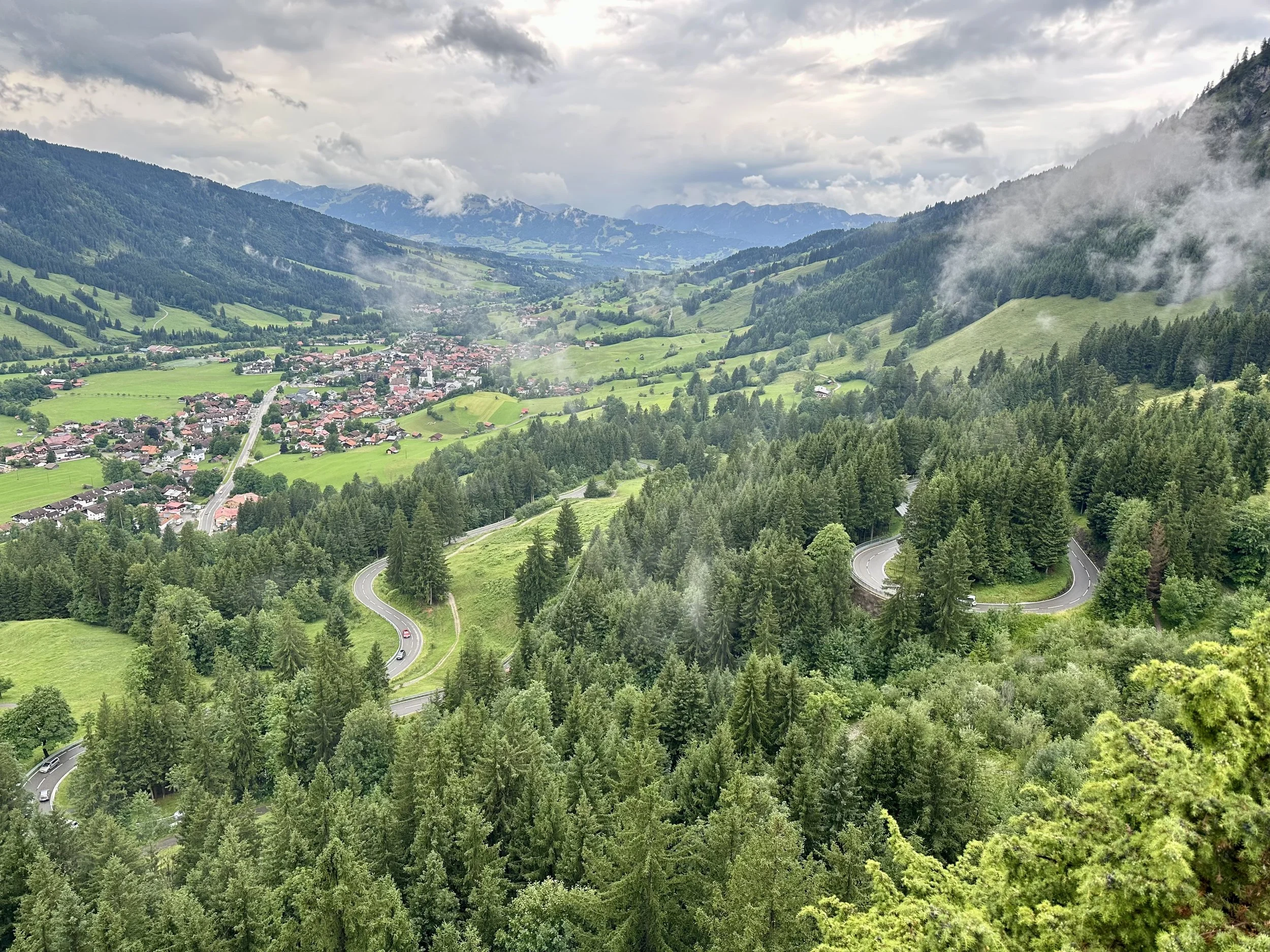
Weather
July weather in the Bavarian Alps is ideal for cycling, with average afternoon temperatures in the low 70s°F (21-22°C). But as those who have spent summers in other parts of alps know, summer weather can be highly variable: some days may be very warm, with temperatures approaching 90°F (30°C), while other days may require late autumn kit, with cooler temperatures, especially at higher elevations.
It will be cool most mornings at the start of our rides, with temperatures in the mid 50°Fs (12-14°C), and riders may want to wear arm/leg warmers or jackets, stripping them later when they warm up and then stowing those items in their day bags carried by our support vehicles. In July it typically rains around half of the days in the month, although often for only part of the day. Wind chill on our longer descents - of which we only have a few - could be quite cold. Riders will want to have access to a wide range of kit in their day bags: gilet; high-quality rain jacket; wind jacket; insulating mid-layer; arm warmers; knee/leg warmers; long-fingered gloves; neck gaiter; rain cap; wool cap or ear warmers; toe covers and/or Belgian booties; rain shoe covers; dry bibs and socks; etc. Registered participants will receive a detailed recommended packing checklist.
FAQ’s
-
8 nights accommodation in a single occupancy room in 3- or 4-star hotels
8 breakfasts
7 lunches (some mid-ride picnic lunches, others at a restaurant)
8 dinners, which will include local wines and beer
Carbon-fiber road bike rental with 2x12 electronic shifting
Cost of entrance to museums and activities included in our trip design.
7 days guided rides with two support vans and an experienced mechanic
Daily GPS routes for your cycling computer
Pre-ride, mid-ride, and post-ride feed tables, including hydration mix/tablets, fruit, snacks, gels, etc.
Two new bidons (water bottles) that are yours to keep
A personalized day bag (for storing extra kit in the support vehicle) that is yours to keep
A mesh wash bag for your kit (helpful if you use the hotel laundry) that is yours to keep
A Rivendell Cycling wind gilet/vest that is yours to keep
-
Airfare
Lunch on the day of arrival
Lodging before and/or after the trip
The cost of anything you that you might decide to do during your free time, which is not included in our trip design
Personal items purchased during the trip
Personal hotel charges (laundry, snacks, drinks, minibar, etc.)
Alcoholic drinks, other than the local wines and beer included at dinner
Trip insurance (which we require all participants to purchase)
Gratuities for our support team. For this trip, if you are pleased with their support, we recommend a gratuity of €250-400 for the team.
-
$4,700 for a cycling companion (second occupant staying in the same room as a registered participant); this price increases to $5,000 on April 1, 2026
Cycling participants can invite a cycling spouse, other family member or friend to join them at a discounted price if that person stays as a second occupant in the same room as the primary registrant. We regret we cannot accommodate non-cycling companions.
-
Because this is long distance randonnée between Lake Constance and Salzburg, we will be riding village-to-village and moving to a different hotel each day, A typical day will look like something like this:
7:30 AM:
Optional meet-up in a quiet area of the hotel for an inspirational morning devotional based on a scripture passage from the Bible, led by our sports chaplain, Marc Porpilia.7:45 AM:
Breakfast in the hotel’s dining room.8:15 AM:
Return to your hotel room to don the day’s cycling kit and collect day bags, bidons, helmet, gloves, sunglasses, bike computer, lights, etc.8:45 AM:
Drop your luggage and day bags at our support vans, then proceed to our bike staging area with everything you need to ride. Prepare your water bottles, grab snacks, fruit, energy bars or gels from the pre-ride feed table for the first part of the ride, and then attach the cycling computer and lights you charged overnight to your bike.9:00 AM:
Ride begins. Our two support vehicles will be available throughout the day, particularly at the top and bottom of climbs and during rain events, for you to access or drop layers/jackets/gloves from your day bags. Feed stops will be provided at strategic times during the day.Midday:
We will stop for either a picnic or restaurant lunch.3:00-5:00 PM:
We will typically arrive at our day’s destination and that night’s hotel sometime during this time window. Upon arrival you will be treated to a post-ride table before heading up to your room. When feasible, our support team will have arrived earlier than the cyclists, checked us into the hotel and obtained our room keys, and moved our luggage into our single-occupancy rooms.Hotel Arrival-7:15 PM:
Free time to rest/recover, enjoy hotel amenities or explore the town.7:15 PM:
We will meet up in a quiet place in the hotel for the next day’s ride briefing. Typical topics will include a review of the route, the elevation profiles of the more significant climbs, when/where to expect feed stops and lunch, a summary of the weather forecast, and tips on what to pack in your day bag, which you can access from the support van throughout the ride.7:30 PM:
We will meet for dinner, often in the hotel we are staying at, sometimes at a restaurant in town.9:30 PM:
Our goal is to enable you to be back in your hotel room by this time (if you wish) so that you can maximize your recovery. Sleep is key to recovery, and strong recoveries are necessary to sustain the seven consecutive cycling days we have planned. -
This tour is rated a 3.0 intensity, which means you can expect to cycle 45-60 miles (70-100 km) per day, with 3,000 to 5,000 feet (900-1,500 m) of elevation. Much of our route is through the valleys of the Bavarian Alps, and while we do need to cycle over some mountains, the altitude of those summits is not significant. Our first and last days are less than 35 miles (55 km), and our longest day is 70 miles (110 km). Three of our days will have less than 3,000 ft elevation, but you will experience some rather steep grades.
If you have any questions about your fitness level for this tour, please contact us.
